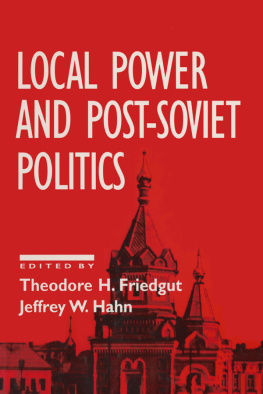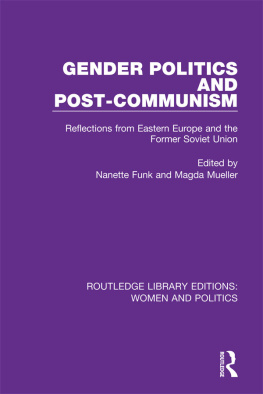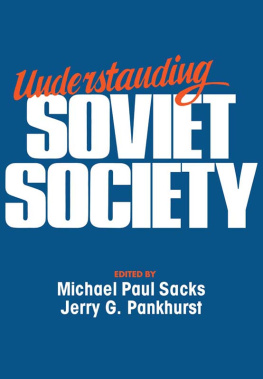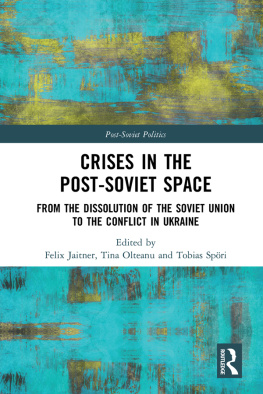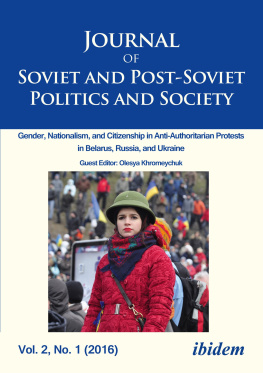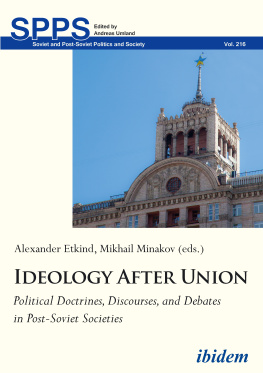Back from Afghanistan: Experiences of Soviet Afghan War Veterans in Transnational Perspective
Felix Ackermann and Michael Galbas
This special issue is aimed at discussing how states and societies have addressed the consequences of the SovietAfghan War (197989), not only during the Soviet period but also in the aftermath of 1991 . By bringing together new original research on Ukrainian, Russian, and Tajik veterans we set out here to examine and compare the impact of the SovietAfghan War from a transnational perspective, across different post-Soviet contexts.
From the perspective of conscripts from
The SovietAfghan War and its Consequences
When Soviet troops entered Afghanistan on 25 December 1979, the last large-scale battle of the Cold War started. The declared official goal of the invasion was to uphold Eventually, having failed to achieve any of its strategic goals, the Soviet leadership finally decided to withdraw its troops and ended the intervention officially on 15 February 1989.
In addition to the human losses
The Soviet intervention and the subsequent withdrawal had various effects on Afghanistan itself and on neighboring societies.
The Soviet and the more recent war in Afghanistan share certain features.
An important difference between the two cases arises out of the Soviet attempt, throughout the greater part of the war, to avoid reporting any casualties whatsoever. Throughout on a small scale, on individual families, and on a large scale, on Soviet society as a whole.
We see a further parallel in the political decisions that were made to withdraw troops in the late 1980s and in the early 21 st ce n tury even though or rather precisely because no military victory was in sight. Both sets of troop withdrawals were based on a ce r tain degree of acceptance of the following of the interve n tions.
Even given all the parallels above, there are obvious diffe r ences when it comes to the soldiers who fought the two wars. The most striking difference is between the large-scale conscription army deployed in the Soviet case and the compact professional military contingents that participated on behalf of several states in Operation Enduring Freedom and ISAF . Together with techn o logical changes this resulted not only in a remarkable difference in terms of the soldiers equipment. Thus, the Soviet system of conscription brought thousands of barely prepared soldiers to Afgha n istan. Many of them did not know in advance that they were about to operate in a full-fledged war and were not familiar with the r e gional specifics. In addition, most of them would not, if given the choice, have opted for risking their lives for the sake of intern a tional solidarity. In many cases conscripts experienced service in the Soviet army and in the SovietAfghan War in particular as a kind of forced migration and slave labor. This is obviously very different from the case of the early 21 st century professional armies, whose soldiers are by definition volunteers who decide to join the armed forces knowing that they will likely be exposed to violence in one of the global conflict hot spots. The public discourses in the US and Western Europe on psychological consequences such as post-traumatic stress disorder ( PTSD ) and new programs of social care for veterans also reflect a considerably higher social awareness of the risks that the soldiers shoulder when returning from wars to their families.
The Return of Soviet Soldiers to New Post-Soviet Republics
The return of the last veterans from Afghanistan in 1989 was an important part of the political upheaval that helped to bring about the dissolution of the Soviet Union.
After the collapse of the Soviet Union, the formal legal recognition However, to this day the afgantsy do not enjoy legal equality with the veterans of the Great Patriotic War, and have access to a lower level of s o cial benefits.
A rising level of cooperation with state institutions on the part of veterans organizations in Russia, aimed at gaining more recognition from the state, can be observed from the 2000s o n wards. In the frame of the resulting new public-private partnership between the state and veterans organizations a joint vision of the history of the SovietAfghan War has likewise emerged. As part of this vision, representatives of both the state and the major vete r ans organizations have joined forces to draw a heroic picture of the Soviet intervention. Critical aspects such as the physical and psychological consequences for the soldiers as well as strategic and tactical mistakes made by both political and military leaders have been excluded from this heroic image. In Putins Russia state actors have deployed this picture of the war especially to support a new national patriotic identification with the state. At the same time representatives of the state offered the veterans a changed function in the public discoursesomething we would describe as a kind of official co-optation of the veterans, who were promised greater recognition and social re-integration in exchange for their loyalty. For those veterans who were members of organized veterans groups, the cooperation with the state offered the prospect of a higher level of retrospective social approval for the Soviet intervention in Afghanistan and constantly a higher level of social a c ceptance and a higher social status for the wars veterans.
In other post-Soviet republics the picture is quite different. In Ukraine the afgantsy were also dissatisfied with the welfare and demanded
In the Baltic states afgantsy are organized and active, but they do not make their claims for social rights public. In these societies the deployment of Lithuanian, Latvian, and Estonian co n scripts in the SovietAfghan War is not easily combined with the dominant narratives of national pride. Nevertheless the veterans from Lithuania, for example, were able to gain some legal recognition as victims of totalitarian rule. Some insights into the cond i tions of their lives today are given by the visual anthropologist Anna Reich in her photo essay about Lithuanian veterans from the SovietAfghan War at the end of this issue.
In the nearby Republic of Belarus the newly arisen veterans organizations developed different strategies and approaches to deal with state structures in order to gain social benefits
These examples illustrate how much variation there has been in dealing with the SovietAfghan war experience across the newly independent states after the collapse of the Soviet Union. In order to gain insights into the handling of the SovietAfghan war experiences by the veterans within the Soviet Union, we open this special issue with Yaacov Rois article The Varied Reintegration of the Afghan War Veterans in their Home Society. Roi shows the very different paths of afgantsy returning from war in Afghanistan into the Soviet society. In this context he analyzes the factors that affected the re-acclimatization of the afgantsy into civilian life. Based on this, Roi highlights the fact that the strategies used in the reintegration of the veterans were not only the result of conscious choice but depended to a large degree on objective conditions such as the timing of their return home, for example, before or after the emergence of glasnost and perestroika.
In our understanding, the specifics of the returning veterans different responses
Four Dimensions of the Collective Afgantsy Experience
The contributors to this special issue focus on the question of how the collective experiences of the afgantsy influenced them in nav i gating the radically changing social and political context in the late 1980s and beyond. We regard the veterans as a social group, spread across all of the former Soviet republics and united by a shared set of experiences, which makes them one of the last Soviet discussed in public. Thus, the afgantsy were caught between sharply contrasting attitudes towards and policies on the war. Fu r thermore, with the dissolution of the Soviet Union the afgantsy now had to find their place in the societies of the newly indepen d ent states.


